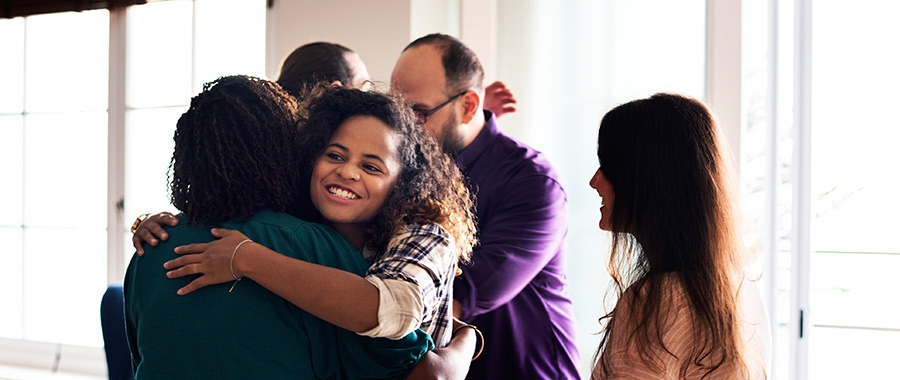The views expressed in our content reflect individual perspectives and do not represent the authoritative views of the Baha'i Faith.
Our homes play an important part in our efforts to change a culture of isolation.
That culture encourages us more and more to be isolated and inward-facing, moving away from home life as the center of community development.
Changing the way we perceive our own homes, then, is an important step in changing the way we perceive our communities.
Family will always be the nucleus of society, where we receive our first education and share a space with others—but that space is more than just a place, and has tremendous power in shaping human interactions.
In many societies, as we grow more isolated from each other, our homes become a profoundly personal space that we don’t share with anyone. We come up with excuses for having people over: “My home is too small,” “I’m too disorganized,” “There are cooler places to gather with friends”… but isn’t this a sign of the value we assign to interpersonal relationships?
If we value the size or “entertainment value” of the home over the person we are visiting, aren’t we more concerned with materialism than with friendship? If we aren’t willing to tidy up or make space for people to visit us … do we value our own comfort over that of others?
It’s not our fault that we are accustomed to this way of thinking. The availability of new social spaces in urban settings makes it easy to move to a more neutral public spot. People aren’t always comfortable hosting, which sets a pattern of how friendships play out. But without the intimacy created by hosting people in our home, a culture of loving openness and connection becomes more difficult to strengthen.
The Baha’i teachings, both explicitly and implicitly in the nature of the activities they promote, encourage us to make our homes into centers of unity, through which we manifest many virtues:
You must manifest complete love and affection toward all mankind. Do not exalt yourselves above others, but consider all as your equals, recognizing them as the servants of one God. Know that God is compassionate toward all; therefore, love all from the depths of your hearts, prefer all religionists before yourselves, be filled with love for every race, and be kind toward the people of all nationalities. Never speak disparagingly of others, but praise without distinction. Pollute not your tongues by speaking evil of another. Recognize your enemies as friends, and consider those who wish you evil as the wishers of good. – Abdu’l-Baha, The Promulgation of Universal Peace, p. 452.
Inviting people into our homes is an easy, concrete way to practice showing love and affection in our own lives. Being a host means preferring others above ourselves, and showing love, compassion and hospitality. The conversations we have in our homes also help shape our relationships and the culture of a place in a very direct way: we begin to build a habit of what we do when we are relaxed and with friends and loved ones, and when we are most authentically ourselves.
Sometimes this type of warm, welcoming home life is easier to envision as one that belongs to a family, in a lavish home where large dinners can be hosted in the utmost comfort. But that doesn’t have to be the case. We can invite our friends into our homes for friendly gatherings, for music, prayers and devotionals, or to create any space where unity prevails, even if we are college students with roommates, or elderly people living alone.
It’s not about having elaborate food, or constantly “entertaining” people, or creating bonds based on material comforts—rather, we look to start conversations and allow people to get to know each other. Sometimes, this can mean that everyone cooks together, or that people show up whenever, or that someone else organizes the activity that takes place in our house. There are no rules, but the mentality with which we open up our home is crucial. We are trying to create a center of unity, not make ourselves a popular entertainment destination.
We can find ways to make people feel comfortable: maybe hosting a barbeque in the yard, or holding some sort of organized activity in our home that is more comfortable for a culture where home visits are not common. Or maybe we can just give it a try and see what happens … at the end of the day, who knows? Maybe the people in our communities have been longing to find a space like this all along.
Abdu’l-Baha shared a beautiful description about what our homes should look like:
My home is the home of peace. My home is the home of joy and delight. My home is the home of laughter and exultation. Whosoever enters through the portals of this home, must go out with gladsome heart. This is the home of light; whosoever enters here must become illumined. This is the home of knowledge: the one who enters it must receive knowledge. This is the home of love: those who come in must learn the lessons of love; thus may they know how to love each other. – Abdu’l-Baha, Star of the West, Volume 5, p. 40.
In this way, our homes transform from a place of individual leisure into a radiant hearth that can belong to our whole community, and that can be a constant source of warmth, comfort, happiness and joy for our friends.
















Comments
Sign in or create an account
Continue with Googleor